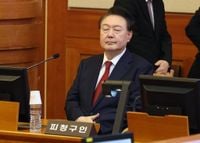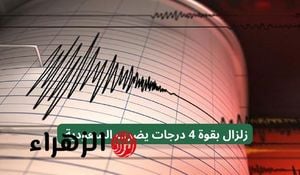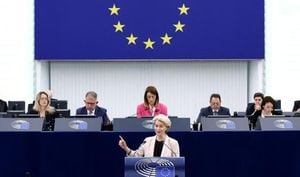The Constitutional Court of South Korea is set to announce its verdict on President Yoon Seok-yeol's impeachment trial at 11 AM on April 4, 2025. This momentous decision comes after a lengthy deliberation period of 123 days since the controversial declaration of a state of emergency on December 3, 2024, and 111 days since the National Assembly approved the impeachment motion on December 14, 2024. The trial has garnered significant public interest, making it one of the longest presidential impeachment proceedings in South Korean history.
On the morning of the verdict, the Constitutional Court held a final deliberation session at 9:30 AM, which was likely focused on refining the decision document. The court requires at least six out of eight judges to approve the impeachment for it to be upheld. If the impeachment is successful, President Yoon will be removed from office and may face criminal charges. Conversely, should the court dismiss the motion, he will immediately resume his presidential duties.
The key allegations against President Yoon include the unconstitutionality of the emergency declaration, violations of the Government Organization Act, attempts to manipulate the National Assembly, and alleged interference in election management. These charges are serious, and if the court finds any of them to be significantly unconstitutional or illegal, it could lead to Yoon's removal from office.
The impeachment trial has seen extensive proceedings, including 11 preparatory hearings leading up to the final deliberation. Witnesses included high-ranking military and police officials, such as former Special Warfare Commander Yuk-gun Geun and former Seoul Metropolitan Police Chief Kim Bong-sik, among others. President Yoon attended the trial sessions after being indicted by the National Assembly on January 19, 2025, but he chose not to appear for the final verdict, citing security concerns and the need to maintain order.
As the nation holds its breath for the ruling, both supporters and opponents of the impeachment gathered in different locations, with significant police presence to maintain order. The police have declared a Grade A emergency, mobilizing over 7,500 personnel around the Constitutional Court and nearby areas. A 'sterile zone' of 150 meters has been established around the court, prohibiting any gatherings or demonstrations in that vicinity. Additionally, various public facilities, including schools and businesses near the court, have temporarily closed to ensure public safety.
In anticipation of the verdict, various political leaders have expressed their hopes for a fair and just outcome. Kim Yi-soo, a former Constitutional Court Justice and co-representative of the National Assembly's impeachment prosecution team, emphasized the need for a conclusion that aligns with the expectations of the public. He stated, "I hope the Constitutional Court delivers a decision that is both obvious and clear, reflecting the common sense of the sovereign people." He also noted that the delay in announcing the verdict after the final hearing on February 25 was unprecedented compared to previous cases involving former Presidents Roh Moo-hyun and Park Geun-hye.
Meanwhile, Yoon's legal representative expressed confidence in the judges' wisdom, stating that the president had acted within his constitutional rights during a national crisis. The political landscape remains tense, with both pro-impeachment and anti-impeachment groups actively demonstrating their positions. Jeong Cheong-rae, head of the National Assembly's impeachment prosecution committee, called for a unanimous decision to remove Yoon, labeling him as the mastermind behind a coup attempt.
As the court prepares to deliver its decision, the implications of the ruling extend beyond the immediate fate of President Yoon. If upheld, it could set a significant precedent for future political accountability in South Korea. Conversely, a dismissal could embolden Yoon's administration and alter the political dynamics in the country.
In the lead-up to the verdict, key government officials, including Han Deok-soo, the acting president, have adjusted their schedules to monitor the situation closely. Han is prepared to issue directives to maintain security and manage any potential fallout from the court's decision. He emphasized the need for stable governance, regardless of the outcome.
Public sentiment is palpable, with many citizens anxiously awaiting the court's ruling. The Constitutional Court's decision is expected to resonate deeply within South Korean society, reflecting broader concerns about democratic governance and the rule of law.
As the clock ticks down to the verdict, the nation remains on edge, with the outcome poised to have lasting implications for the future of South Korean democracy. The court's ruling will not only determine the fate of President Yoon but also shape the political landscape for years to come.


![[속보] 탄핵심판 선고 앞두고 헌재 인근 '긴장'](https://thumbor.evrimagaci.org/3Oc3ENkS4tZWcovRTx_UVvEPjTQ=/200x0/tpg%2Fsources%2F56055248-0df1-4167-a6dc-2bbf06359c02.jpeg)
![[속보]국회 측 “헌재, 주권자 상식에 부합하는 결론 내려주길”…심판정 입장](https://thumbor.evrimagaci.org/Z_xE72dDv_IItXDjnFRnkLzK4do=/200x0/tpg%2Fsources%2F8c429e49-949c-4e84-ad33-f6be2ef72c49.jpeg)



